Boys Cry Too

Breaking the Stigma about Men and Mental Health

Men's mental health deserves so much more attention.
According to The Canadian Men’s Health Foundation, Canadian men are dying at an alarming rate from chronic illness. Yet 70% of men’s health problems are preventable by living healthier - which includes taking care of their physical AND mental health. However, many men are suffering in silence and the consequences are devasting as health issues go undiagnosed and untreated. Why are so many men leaving their loved ones behind?
There’s still the idea that mental illness equates to weakness and it is one of the many reasons why we need to change the conversation about men and their mental health.
We need to break the stigma so men can live healthier and longer lives.
The facts about men and mental health:
Did you know…
According to the Canadian Mental Health Association, men’s mental health has been called a ‘silent crisis’, but the statistics from around the world show why we can no longer stay quiet.
- Among Canadians of all ages, 4 out of 5 suicides are male (that’s an average of 50 men per week dying of suicide)
- Depression is rising among men and decreasing among women
- Women are 3x more likely to seek mental health support than men
- Men are 3x more likely to experience substance abuse than women
- In British Columbia 81% of drug overdoses recorded were male
- 75% of men are unable to openly tell their male friends that they have mental health problems
- In Canada, young and middle-aged men are being hospitalized for schizophrenia in increasing numbers
- New fathers are also vulnerable to postpartum depression
- Men go through a similar hormonal change as they age as women, the male menopause or andropause, is often triggered when men reach their 40s
The unique challenges facing men:
Men struggle with what it means to be ‘a real man’.
Throughout history, certain traits have been widely accepted or glorified as the ‘masculine ideal’. Many of these traits emphasized the importance of strength, power, independence, control, dominance and virility. These traits of ‘manliness’ have been reinforced in cultures and societies of all kinds and have left a lasting impact on generations of men.
Many of these ‘masculine ideals’ are toxic to men and our society as a whole.
We have grown up in a culture where ‘male machismo, homophobia, misogyny and patriarchal ideology’, have created male stereotypes that continue to do harm. It's easy to forget how the weight of masculine bravado and a culture that prides aggressive, emotionless and (often) violent behaviour affects men. It starts with the playground taunts: 'boys don't cry' or 'you throw like a girl', and eventually it colours the ways men are 'supposed' to act in order to be a ‘real’ man.
Here are some examples you’re probably familiar with…
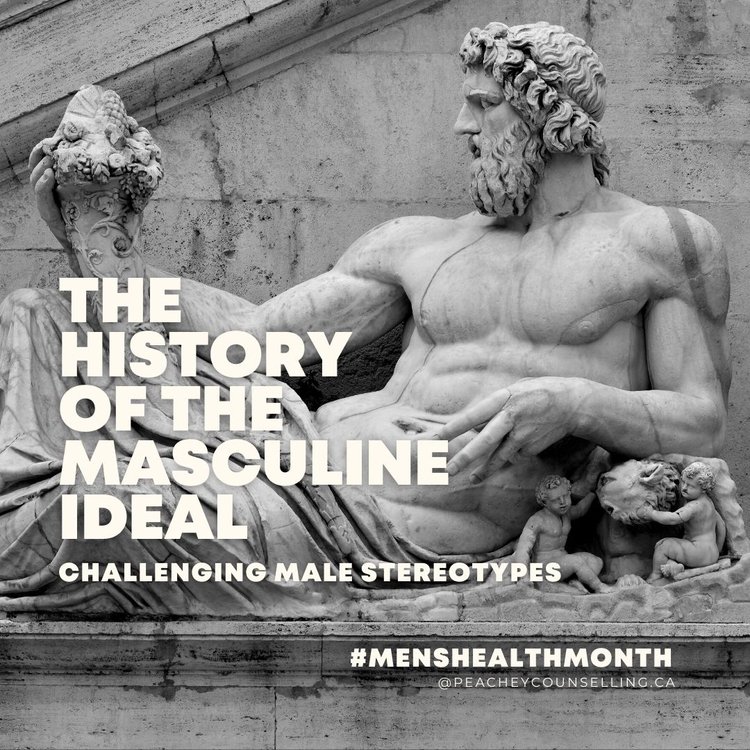
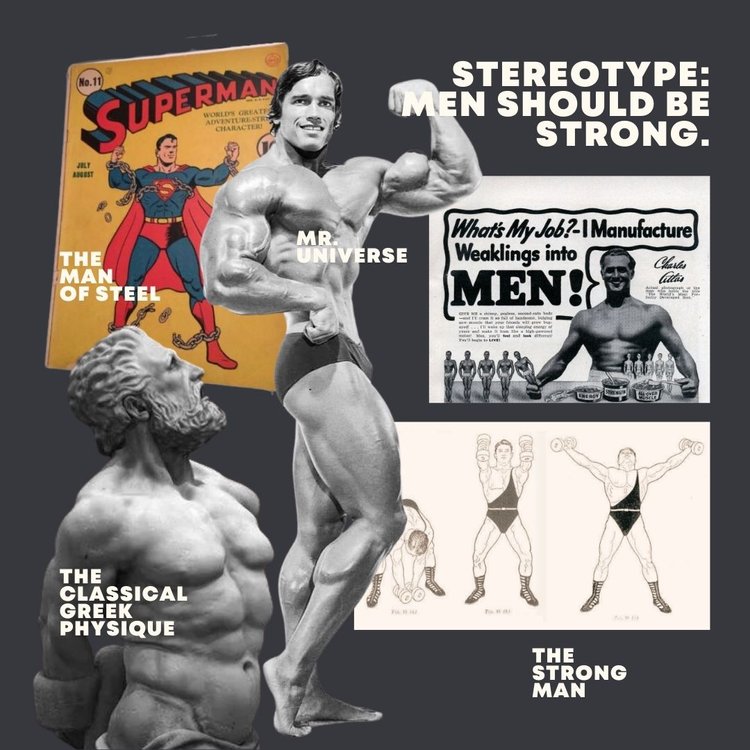
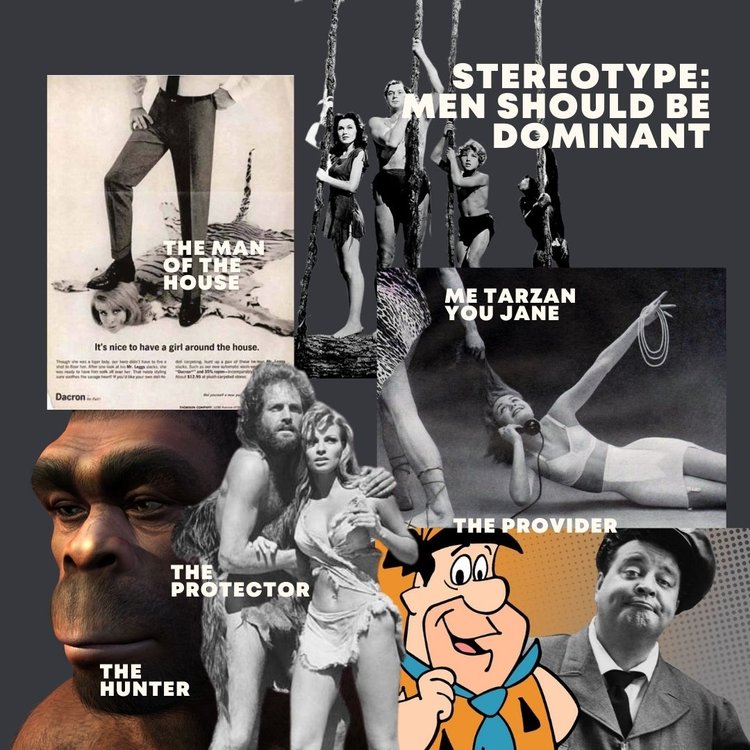


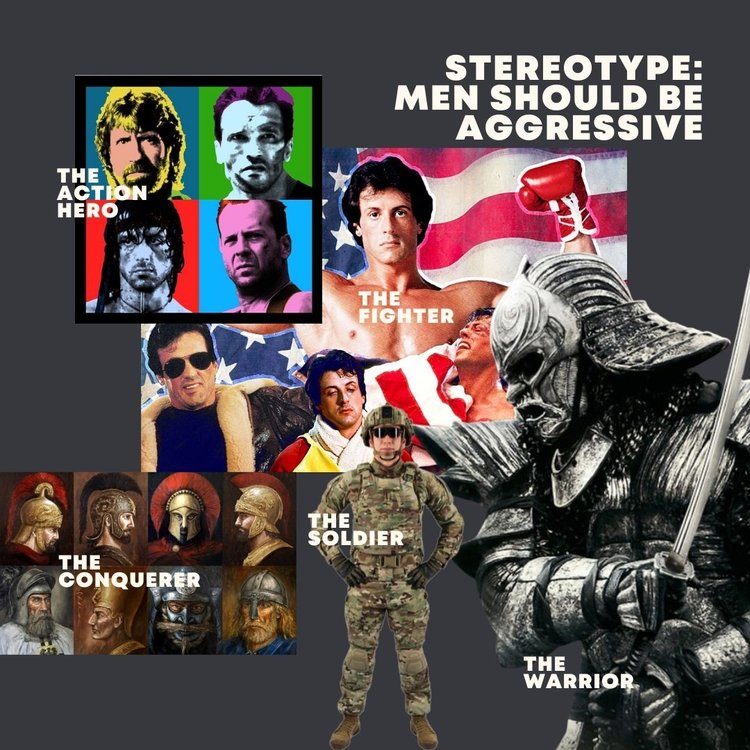

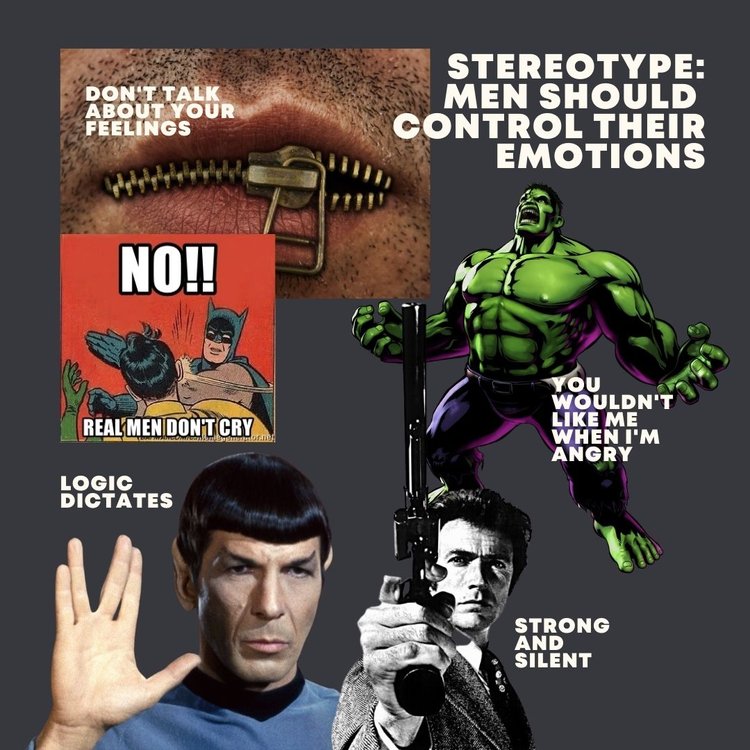
- Boys don’t play with dolls
- Nice guys finish last
- Quitters are losers
- Men don’t wear makeup
- Men don’t talk about their feelings
- Women want their men to be men
- Men don’t get eating disorders
- Childcare is women’s work
- Men should look like men
- Pink is a girls’ colour
- Boys will be boys
- Every man needs to know how to fight
- Men wear the pants in the family
- Just be a man
Many men still seem governed by these ‘traditional’ standards and stereotypes of male behaviour.
Past generations of men speak of ‘a time when men were men’, and when it comes to the way men present themselves in public, many men feel like they need to adhere to these ‘old-school’ social norms. However, when you look in the eyes of the boys and men that repeat the damaging words and actions they've heard throughout their lives, it's easy to see how male stereotypes perpetuate a cycle of hurt and prejudice about what gender expression should look like - and men feel trapped.
Men are lonely.
According to a survey by U.K’s Movember organization, men often have fewer closer friends as they age and lack ‘social connectedness’, which directly impacts their mental well-being. Because of this, many men end up feeling lonely and loneliness is one of the most frequent stressors in men’s lives. Social support is key to dealing with mental health issues like depression but it’s often very scary thing for many men to actually open up to others. A lot of guys recognize that friendships are important, but the influence of ‘toxic masculinity’ can cause men to doubt what is “okay” in friendships. It’s common for men to view their mental health struggles as signs of weakness, and avoid talking to friends about their problems as a result. This tends to lead to more surface-level friendships or acquaintances rather than deep, meaningful relationships and as a result men struggle to build the support networks they need.
As a result, men believe they can - and need to - overcome their challenges alone.
It is now obvious that negative male and societal attitudes have reinforced barriers for men to get the help they need. A 2018 Canadian survey reinforced these stigmatizing beliefs, revealing that more male than female respondents said that they would feel embarrassed about seeking formal treatment for depression. Studies also show that the majority of men are ashamed to seek help and believe they can independently overcome their mental health challenges.
There’s a tendency for men to ‘ignore’ the problem.
Men believe that they cannot take the time to look after their health (both mental and physical). In fact, data suggests that 40% of men would prefer to try and hide any issues from their friends, boss and loved ones, out of fear that it might negatively impact their reputation, career or relationships. Instead, men tend to use negative coping styles—such as misusing alcohol and drugs, socially isolating or withdrawing from relationships, concealing and ignoring negative emotions, engaging in risky behaviours, and valuing self-reliance and autonomy over professional care. When men do finally get dragged into therapy or ask for help, it’s because things have gotten so bad they just can’t hide that they’re struggling anymore. As a result of the delay, they have an even bigger ditch to climb out of, and initial treatment is focused on treating the crisis before long-term coping strategies can be developed.
The opportunities:
Men are speaking out and normalizing conversations about mental health.
There have been many well known men - including athletes and celebrities - who have spoken out about their mental health challenges which has gone a long way in opening up the conversation about challenging the stigma of weakness that men face.
Here are just a few examples:
“For the longest time, I thought asking for help was a sign of weakness because that’s what society teaches us. Well, you know what? If someone wants to call me weak for asking for help, that’s their problem. Because I am saving my own life.
MICHAEL PHELPS, 23 TIME OLYMPIC GOLD MEDALIST
“I found that with depression, one of the most important things you could realize is that you’re not alone. You’re not the first to go through it; you’re not going to be the last to go through it.”
DWAYNE JOHNSON
“I want men to know that their internal struggles are just as valid as any other struggle, and these do not make them less of a man. What I’m finding, though, is many men don’t know how to ask for help.”
TIMOTHY WENGER
As more and more men (especially those in the public eye) speak about their experiences with mental illness, other men will be able to see that the struggle they are feeling is real and they are not alone. If we can continue to normalize the fact that stress and everyday demands are not limited to gender, more men can get the help they need before things become serious.
We now know that health includes mental health.
While society still has some work to do in reducing the stigma around mental illness, there has been a lot of progress in the way we think about our wellbeing, longevity and happiness. Mental health is just as important as physical health and seeking treatment is not a sign of weakness.
Think of it this way. If you’re driving your car and it keeps making a ticking sound, you won’t ignore it. You will try to figure out whether it’s a serious problem or not. Getting the best performance out of your car or truck is not so different from taking good care of your health - and that includes your mental health.
In the same way, as you need to charge your battery or put gas in your tank, you need to recharge and refuel yourself. Self-care and healthy habits such as regular exercise, nutritious eating, getting good quality sleep, connecting with people, having time to yourself, spending time in nature, and engaging in fun activities are good ways to fill up your tank. In addition to the basics to keep your motor running, regular inspections and tune-ups are also recommended. If you have clocked a lot of kilometres or have been driving in harsh climate conditions, then your vehicle may need more upkeep. Maybe it’s things you can do on your own, such as top up your oil, but other times, you need a professional to help. Professionals have access to specialized tools, not to mention the know-how based on training and experience.
The future:
We need to encourage men to talk about their mental health.
How many times have you heard the words ‘I’m fine’ when you asked your husband/boyfriend/father/son/friend about their mental health? The truth is that it can be tricky to start a dialogue with men about the emotional and mental challenges they might be facing because of the barriers and societal expectations we’ve discussed. But you don’t need to have special training to have an open conversation about mental health.
Talking about mental health doesn’t have to be awkward. ‘Intervention-style’ conversations can be intimidating and cause someone to withdraw from the talk altogether. Instead, you want to make the experience as comfortable and nonthreatening as possible. For example, try to engage with them during an activity that they enjoy. “You look like you could use some fresh air. Do you want to go for a walk and talk?”
Be aware that most people will say that they’re fine even if they’re struggling with a mental health problem. Concerns like doubting whether people really want to hear the honest answer and not wanting to burden others are often the main reasons people avoided these conversations. If you get brushed off with responses like “I’m fine” or “I’m okay” when you try to broach the subject of mental health, be sure to ask twice and show that you really are interested. Plenty of men feel like they shouldn’t need to ask for help and it’s easy to let the conversation slip away if the concerned party doesn’t press further. In this case, an effective strategy is to make sure you ask them the question a second time. “No, really, how are you? I care about you.”
That second ask might be the opening someone has been waiting for to finally talk about it.
Men… it’s time.
If you’re experiencing a nagging feeling that something is not quite right about your thinking, feelings or behaviour, it may be time to consider speaking to someone...especially if you DO NOT have it all under control. And, getting help doesn’t always have to be a difficult, overwhelming task.
“Sometimes it’s as simple as saying something like, ‘I’ve been feeling like sh-t lately and I’m not really sure what’s going on. Can I run some things by you to get your take on them?'”
People often feel a huge sense of relief after finally letting others know what they’re going through and mental health issues are a lot more common than you might think.
Seek help. Don’t suffer in silence.
Despite massive efforts to educate the public, mental illness has become an epidemic and silent killer of boys and men of all ages. Toxic masculinity has made men think that they can't have a mental illness or seek professional help. Men don't need to 'man up', they just need the proper support for their mental health.
We need to continue the public conversation about mental health issues and their effect on men. We need to reduce the stigma that needed and getting support is somehow a show of weakness. Because it’s not. It’s human.
It’s time to break the stigma.

Whatever it is, we’re here for you.♡
Life is uncertain. Parenting is hard. Relationships take work. Families can be dysfunctional. And sometimes love hurts. When you’re confronted by feelings, events, or issues that are making your life challenging, it’s ok to ask for some help.





